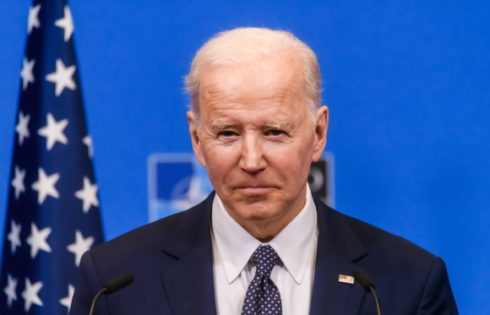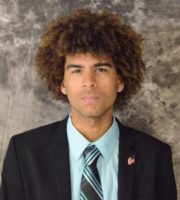
Also worries Democratic presidential win could spark another Civil War
A University of North Carolina at Chapel Hill professor recently called free speech racist and said he worries that if a Democratic presidential candidate wins the 2020 election it could spark another Civil War.
Eric King Watts, an associate professor of communication studies, made the comments during his keynote speech “Tribalism, Voicelessness, and the Problem of Free Speech” that kicked off a two-day conference on free speech.
“Democracy needs free speech, but it is increasingly vulnerable to its excesses,” Watts said in his speech.
“I will first set forth how freedom of speech is implicated in racism by linking its historical contingency to the production of blackened flesh,” Watts said. “I will demonstrate how racism produces its uneven distribution of capacity and debility….”
The speech was audio recorded and first reported by the James G. Martin Center for Academic Renewal, and reporter Branson Inscore recently provided audio clips of the speech to The College Fix.
Watts has not responded to repeated requests from The College Fix seeking comment.
Watts’ speech was given in late October as part of the two-day free speech conference held at UNC Greensboro titled “Finding Expression in Contested Public Spaces.”
The basis of Watts’ argument was predicated upon the fact that the institution of slavery was in operation at the time the Bill of Rights was ratified. Watts argued that, since its conception, the right to speak freely was not applicable to some groups and thus has enabled injustice and disparity to pervade American society.
“In particular, freedom of speech is conceptualized and found in documents as a universal human capacity and right requiring legislative and judicial protections, but this late-18th-century idealism obscures the manner in which freedom of speech is always already implicated in racism,” Watts said.
“… The very idea of freedom, postulated in universalist terms in the 19th century, and serving as the ontological structure for the First Amendment, doesn’t allow the black. This exclusion is not legal, nor paralegal; it is brokered by the psychic structure and pseudoscience responding to the biopower imperatives of racism.”
“Put sharply, this exclusion is racist,” Watts said.
According to Inscore’s summary of the professor’s talk, “Watts primarily identified the harmful consequences of free speech with one political party: the Republicans.”
“When Watts finished his speech and the audience could respond, free speech itself wasn’t the center of the discussion,” Inscore wrote. “Rather, the dialogue operated under the presupposition that everyone present was on the same political team and dedicated to defeating the Republican party in the 2020 elections.”
At one point in the speech Watts noted “we are faced, by the way, with a toxic super-spreader in the White House, who daily attacks the Constitutionality of the House impeachment proceedings, among other things.”
“And, Fox’s Tucker Carlson, who nearly every day broadcasts fear of the brown hordes amassing at the southern border infecting real America.” Watts went on to criticize Carlson’s critique of the diversity narrative and added the “white tribe” is angry over the effects of globalization.
“Important to this antagonism is the pursuit of what the Proud Boys call ‘maximum freedom.'”
During the Q&A, Watts suggested another Civil War could spark depending upon the outcome of the next presidential election. The comment was made in the context of alt-right extremist social media echo chambers, a major focus of his speech.
“In my worst nightmares, one Democratic candidate wins in 2020 and that’s the precursor; that’s the Fort Sumter shot,” Watts said. “That’s not Appomattox … that’s 1861. That’s what I fear.”
“And that is part of the discourse of the far-right,” the professor continued. “Because it will legitimize a whole host of conspiracies that are alive and well now.”
He said the Left must finds ways to break through strongholds to counteract hate, “but at the same time tribal war will not be alleviated by a 2020 Democratic president.”
According to his online faculty bio, “Dr. Watts examines the diverse phenomena of African American public voice and its relation to the representation of the black body, the meanings of blackness, the shape of civic culture and community; voice and voicelessness are understood as being impacted by the rhetorical agency of the subject, the terms of one’s publicity, and the power relations that make up one’s various identities.”
Inscore, in reporting on the conference, noted the majority of speakers and panelists also expressed disapproval of both freedom of speech and the Trump administration.
“Most speakers at the free speech conference promoted the idea of restricting free speech to ensure space for ‘marginalized’ and ‘oppressed’ voices,” Inscore reported. “But at least one student questioned the one-sidedness of the conference.”
The question prompted mixed reactions from the audience. Panelist Mark Congdon Jr., assistant professor at College of Saint Rose, dismissed the student’s question and concern with a lengthy and hypothetical response, according to Inscore.
“Yes, [diversity of opinion] is important when we talk about how do we incorporate these other voices, like more conservative or things like that,” Congdon said. “But then understanding, as the other panelists have mentioned, how free speech can also be used to oppress – and it gets at power and authority – in terms of how you might be using your free speech to silence and harm others. And that’s not okay, regardless of anyone’s political views.”
RELATED:
IMAGE: Way Home Studio / Shutterstock
Like The College Fix on Facebook / Follow us on Twitter






Please join the conversation about our stories on Facebook, Twitter, Instagram, Reddit, MeWe, Rumble, Gab, Minds and Gettr.